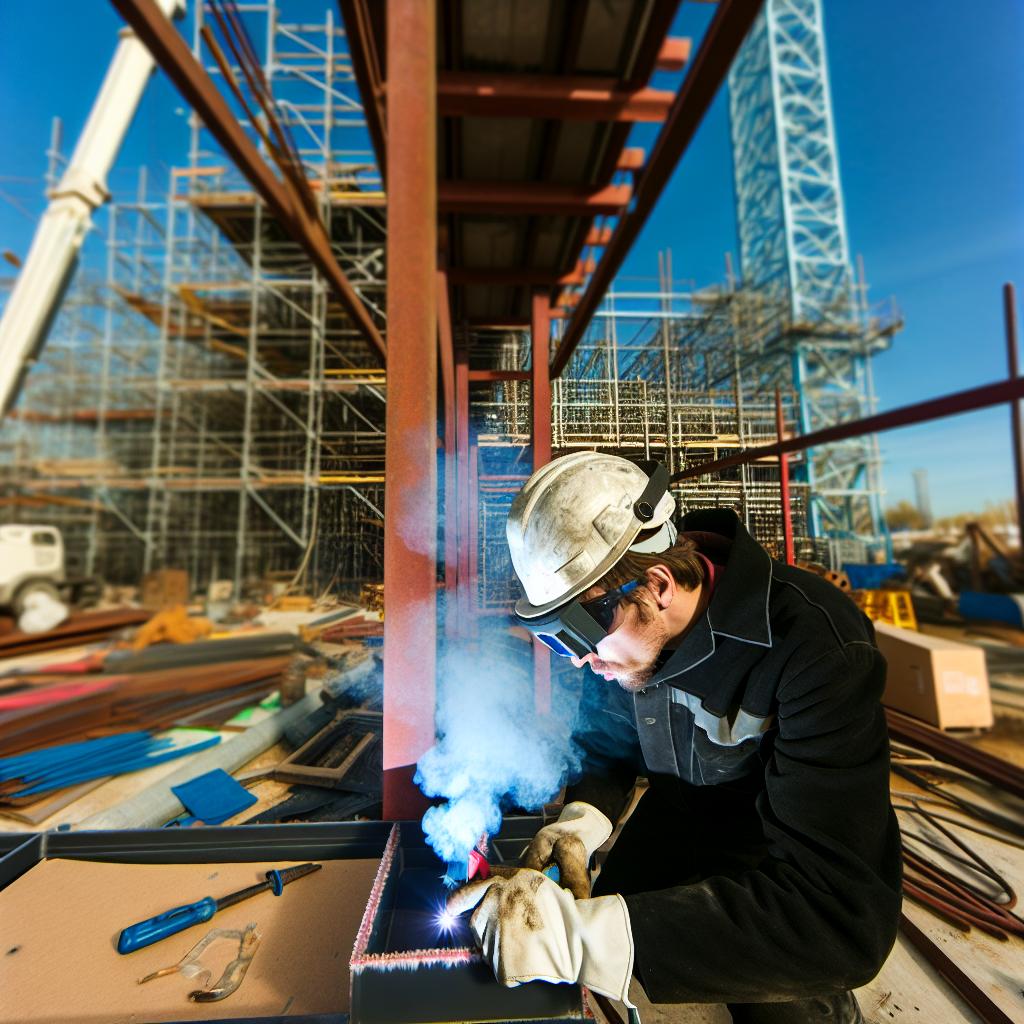Introduction
A boilermaker is a skilled tradesperson who fabricates and installs boilers.
Boilermakers are crucial in industries such as construction, manufacturing, and energy production.
Starting the Day
Boilermakers typically start their day early in the morning by reviewing plans and safety procedures before beginning work.
Job Duties
Their responsibilities include cutting, bending, and welding metal to construct boilers and other large containers.
Working Conditions
Boilermakers often work in cramped spaces, at heights, or in extreme temperatures.
Safety equipment is always worn to minimize risks.
Collaboration
Boilermakers frequently work alongside engineers, inspectors, and other construction workers.
They ensure projects are completed safely and efficiently.
Problem-Solving
They must possess strong problem-solving skills to troubleshoot and resolve issues.
These issues may arise during the construction process.
Quality Control
Boilermakers conduct quality control inspections to ensure boilers meet industry standards and regulations.
This is done before they are put into use.
Physical Demand
The job can be physically demanding, requiring strength and stamina to lift heavy materials.
Boilermakers often work in challenging conditions.
End of the Day
At the end of the day, boilermakers clean up their work area and review progress.
They prepare for the next day’s tasks.
Significance of Boilermakers
Boilermakers play a crucial role in various industries.
They construct and maintain essential equipment like boilers.
Their work requires skill, attention to detail, and a commitment to safety.
Responsibilities of a Boilermaker
As a boilermaker, your primary responsibility is to construct and repair boilers, vats, and other large containers used in industrial settings.
Transform Your Career Today
Unlock a personalized career strategy that drives real results. Get tailored advice and a roadmap designed just for you.
Start NowThis involves working with a variety of materials, including steel, aluminum, and other metals, to create structures that can withstand high temperatures and pressures.
- Constructing and repairing boilers, vats, and other large containers
- Reading and interpreting blueprints and technical drawings
- Using various tools and equipment to perform welding and fabrication tasks
One of the essential skills required for a boilermaker is the ability to read and interpret blueprints and technical drawings.
These documents provide detailed instructions on the dimensions, materials, and specifications required for each project.
Boilermakers must be able to understand these instructions accurately to ensure that the final product meets the necessary standards.
Boilermakers also need to be proficient in using various tools and equipment to perform welding and fabrication tasks.
This includes operating welding machines, cutting torches, grinders, and other tools to join metal components together and shape them into the desired form.
Boilermakers must have a strong understanding of metalworking techniques and safety protocols to work efficiently and securely.
Day-to-Day Tasks
On a typical day, a boilermaker may start by reviewing project plans and blueprints to determine the materials and tools needed for the job.
They will then gather their equipment and materials before beginning work on constructing or repairing the assigned structure.
Boilermakers must adhere to strict safety protocols to protect themselves and others from potential hazards.
When constructing a boiler or vat, boilermakers typically start by cutting and shaping metal components according to the blueprint specifications.
They then use welding techniques to join these components together into a solid structure.
Boilermakers may need to use heavy machinery, such as cranes or forklifts, to lift and position large parts into place.
Throughout the day, boilermakers may need to make adjustments to the structure to ensure that it meets the required dimensions and specifications.
They must work meticulously to maintain the integrity of the project and make any necessary repairs promptly.
Boilermakers must also communicate effectively with other team members to coordinate tasks and ensure that the project progresses smoothly.
Challenges and Rewards
Working as a boilermaker can be physically demanding and require long hours of standing, bending, and lifting heavy objects.
Boilermakers often work in confined spaces, at heights, or in extreme temperatures, which can pose challenges to their safety and comfort.
However, the satisfaction of seeing a project come together and knowing that they have contributed to building essential infrastructure can be highly rewarding.
Boilermakers often work on diverse projects in various industries, ranging from power plants and refineries to manufacturing facilities and shipyards.
Transform Your Career Today
Unlock a personalized career strategy that drives real results. Get tailored advice and a roadmap designed just for you.
Start NowThis variety of work allows boilermakers to gain valuable experience and develop their skills in different contexts.
Boilermakers may also have opportunities for advancement by specializing in specific areas, such as boiler installation, pressure vessel repair, or pipe fitting.
When it comes to the typical work environment of a boilermaker, there are several key factors to consider.
Outdoor Work
Boilermakers often find themselves working outdoors, whether it’s on a construction site or at an industrial facility.
This means being exposed to the elements, which can include rain, snow, wind, and extreme temperatures.
Industrial Settings
Boilermakers may also work in industrial settings such as power plants, refineries, or manufacturing facilities.
These environments can be noisy, dusty, and hazardous, requiring workers to adhere to strict safety protocols.
Exposure to Extreme Conditions
As mentioned earlier, boilermakers may be exposed to extreme temperatures, heights, and noisy environments.
This can make the job physically demanding and mentally challenging, requiring workers to be resilient and focused at all times.
Collaboration with Other Trades
Boilermakers often work closely with other tradespeople and engineers on a variety of projects.
This requires effective communication skills, teamwork, and the ability to adapt to different working styles and personalities.
The work environment of a boilermaker is dynamic, fast-paced, and constantly evolving.
It requires individuals who are physically fit, mentally resilient, and able to handle the challenges that come with working in industrial settings.
Despite the demanding nature of the job, many boilermakers find it rewarding and fulfilling knowing that they play a crucial role in building and maintaining our infrastructure.
Discover More: Warehouse Manager Interview Tips: Questions and Answers
Training and Education Requirements
Boilermakers must meet certain training and education requirements in order to pursue this career.
Below are some key points to consider:
- High school diploma or GED required
- Boilermakers typically need to have a high school diploma or GED in order to enter the field. This provides a foundation of knowledge and skills that will be built upon through on-the-job training and specialized education.
- Apprenticeship program or technical school training typically necessary
- Many boilermakers complete an apprenticeship program or receive training at a technical school in order to learn the necessary skills for the job. These programs provide a combination of classroom instruction and hands-on experience to prepare individuals for work in the field.
- Certification in welding or other specialized skills may be preferred
- In addition to general training, boilermakers may also need to obtain certification in welding or other specialized skills, depending on the specific requirements of their employer or the type of work they will be performing. These certifications demonstrate expertise and proficiency in a particular area, making candidates more competitive in the job market.
Overall, boilermakers must be committed to continuing their education and training throughout their career in order to stay current with industry trends and advancements.
By meeting these requirements, individuals can successfully pursue a rewarding career as a boilermaker.
Uncover the Details: The Role of a Pipelayer in Construction Projects
Transform Your Career Today
Unlock a personalized career strategy that drives real results. Get tailored advice and a roadmap designed just for you.
Start NowArriving at the Worksite
As a boilermaker, your day typically starts with arriving at the worksite early in the morning.
This is crucial to ensure that you have enough time to prepare for the tasks ahead.
Attending Safety Meetings
One of the first things you’ll do after arriving at the worksite is attending safety meetings.
Safety is a top priority in the construction industry, and these meetings are designed to ensure that everyone is aware of the potential risks and hazards on the job.
Reviewing Work Orders and Project Plans
After the safety meeting, you will review work orders and project plans for the day.
This will give you a clear understanding of the tasks that need to be completed and the timeline for completion.
Performing Welding, Cutting, and Fabrication Tasks
Once you have a good grasp of the day’s objectives, you can start performing welding, cutting, and fabrication tasks as needed.
This is where your skills and expertise as a boilermaker come into play.
Welding
Welding is a crucial part of a boilermaker’s job.
You will be responsible for joining metal components together using heat and pressure.
This requires precision and attention to detail to ensure the welds are strong and durable.
Cutting
Cutting is another important task that you may need to perform as a boilermaker.
This involves using tools like torches or saws to shape metal components according to the project plans.
Precision is key to ensure the cuts are accurate and meet the required specifications.
Fabrication
Fabrication involves creating metal structures or components from raw materials.
This may include bending, shaping, or assembling metal pieces to construct boilers, tanks, or other industrial equipment.
Your ability to fabricate metal parts accurately will directly impact the quality and functionality of the final product.
Overall, a typical day in the life of a boilermaker involves a combination of safety procedures, project planning, and hands-on tasks like welding, cutting, and fabrication.
It’s a challenging but rewarding profession that requires technical skills, physical endurance, and a strong commitment to safety and quality.
Discover More: Physical Health Maintenance for Dockworkers
Transform Your Career Today
Unlock a personalized career strategy that drives real results. Get tailored advice and a roadmap designed just for you.
Start NowChallenges Faced by Boilermakers
Being a boilermaker comes with its own set of challenges that professionals in this field must navigate on a daily basis.
From physical demands to safety hazards, the job requires focus, skill, and determination to overcome these obstacles.
Physical Demands of the Job
- Lifting heavy materials is a major aspect of a boilermaker’s role, requiring strength and stamina to handle the workload.
- Working in confined spaces can also be challenging, as it requires agility and the ability to maneuver effectively in tight areas.
- Boilermakers must be in good physical condition to perform their duties safely and efficiently, often requiring them to maintain a high level of fitness.
Safety Hazards Associated with the Job
- Working with large machinery poses significant risks, including the potential for accidents or injuries if proper precautions are not taken.
- High temperatures are common in boiler rooms and industrial settings, creating a risk of burns or heat-related illnesses for boilermakers.
- Boilermakers must adhere to strict safety protocols and procedures to minimize the likelihood of accidents and ensure a safe working environment.
Tight Deadlines and Project Pressures
- Boilermakers often work under tight deadlines to complete projects on schedule, which can create stress and pressure to deliver results quickly.
- The need to meet project deadlines can result in long hours and overtime for boilermakers, impacting work-life balance and overall well-being.
- Managing project pressures requires effective time management and communication skills to coordinate with team members and meet client expectations.
Despite these challenges, boilermakers are skilled professionals who take pride in their work and strive to overcome obstacles to deliver quality results.
Through dedication, training, and teamwork, boilermakers can successfully navigate the challenges of their profession and continue to excel in their field.
Delve into the Subject: How to Land a Job as a Warehouse Worker

Salary and Job Outlook
Boilermakers are skilled craftsmen who play a crucial role in various industries such as construction, manufacturing, and power generation.
Their work involves fabricating, assembling, and maintaining boilers, tanks, and other large vessels that contain liquids or gases at high pressures.
Median Annual Wage for Boilermakers
According to the Bureau of Labor Statistics (BLS), the median annual wage for boilermakers was $63,100 as of May 2020.
This means that half of all boilermakers earned more than this amount, while the other half earned less.
The highest 10% of boilermakers earned more than $94,620, while the lowest 10% earned less than $38,700.
Factors that can affect a boilermaker’s salary include their level of experience, the industry they work in, and the location of their job.
Boilermakers who work in high-demand industries, such as oil and gas extraction or aerospace manufacturing, may earn higher salaries compared to those working in other sectors.
Projected Job Growth in the Industry
The BLS projects that employment of boilermakers is expected to grow by 1% from 2019 to 2029, which is considered slower than the average for all occupations.
This growth rate is driven by the need to replace aging infrastructure, such as power plants and refineries, which require the expertise of boilermakers to maintain and repair.
Additionally, as industries continue to evolve and adopt new technologies, boilermakers with specialized skills in areas such as welding, blueprint reading, and computer-aided design (CAD) may have better job prospects.
Boilermakers who are willing to pursue additional certifications or training to stay current with industry trends may also have a competitive edge in the job market.
Opportunities for Advancement and Specialization within the Field
As boilermakers gain experience and expertise in their craft, they may have opportunities for advancement within their field.
Some may choose to become supervisors or project managers, overseeing teams of boilermakers and coordinating large-scale projects.
Others may pursue specialized certifications or training to work in specific industries or on particular types of equipment.
For example, some boilermakers may specialize in working on nuclear power plants, while others may focus on fabricating pressure vessels for chemical processing plants.
Transform Your Career Today
Unlock a personalized career strategy that drives real results. Get tailored advice and a roadmap designed just for you.
Start NowOverall, boilermakers who are dedicated to continuous learning and professional development may find numerous opportunities for growth and advancement within their field.
By staying current with industry trends and technologies, boilermakers can enhance their skills, expand their job prospects, and increase their earning potential in the long run.
Importance of Soft Skills in the Boilermaker Profession
Soft skills are crucial in the boilermaker profession as they complement technical skills and contribute to overall job performance.
Communication skills for working with team members and supervisors
Boilermakers often work in teams to complete projects efficiently.
Good communication skills are essential for collaborating with colleagues.
Effective communication ensures tasks are delegated properly and workflow is smooth, leading to successful project completion.
Problem-solving abilities to overcome technical challenges
Boilermakers encounter various technical challenges during construction and repair projects.
Strong problem-solving skills are necessary to address these issues.
The ability to analyze problems, identify solutions, and implement them efficiently is critical for job success in the boilermaker profession.
Attention to detail for ensuring the accuracy of construction and repair work
Precision is key in boilermaking to ensure the safety and functionality of structures.
Attention to detail is crucial for accurate construction and repair work.
By paying close attention to details such as measurements, materials, and specifications, boilermakers can prevent costly errors and ensure high-quality results.
Soft skills play a vital role in enhancing the performance and professionalism of boilermakers in their daily tasks and responsibilities.
Role and Responsibilities of Boilermakers
Boilermakers play a crucial role in constructing, installing, and maintaining boilers, tanks, and other vessels used in various industries.
They are responsible for reading blueprints, using hand and power tools, welding, and adhering to safety protocols to ensure the proper functioning of these essential components.
Career Opportunities in Boilermaking
For individuals passionate about hands-on work, problem-solving, and working in industrial settings, a career as a boilermaker can be rewarding.
It offers opportunities to gain specialized skills, work with a team, and contribute to the functioning of critical infrastructure in a variety of industries.
Importance of Boilermakers
Boilermakers play a vital role in ensuring the safety and efficiency of industrial equipment.
By constructing and maintaining boilers, tanks, and pressure vessels, they contribute to the overall productivity and safety of various industries, including manufacturing, energy production, and construction.
Additional Resources
Boilermakers National Health and Welfare Fund’s benefit helps …
Transform Your Career Today
Unlock a personalized career strategy that drives real results. Get tailored advice and a roadmap designed just for you.
Start NowPBGC Payment Dates | Pension Benefit Guaranty Corporation
[E-Books for Sale]
The Big Book of 500 High-Paying Jobs in America: Unlock Your Earning Potential
$19.99 • 500 High-Paying Jobs • 330 pages
Explore 500 high-paying jobs in America and learn how to boost your career, earn more, and achieve success!
See All 500 High-Paying Jobs of this E-Book
1001 Professions Without a Degree: High-Paying American Jobs You Can Start Now
$19.99 • 1001 Professions Without a Degree • 174 pages
Discover 1001 high-paying jobs without a degree! Unlock career tips, skills, and success strategies for just $19.99!




